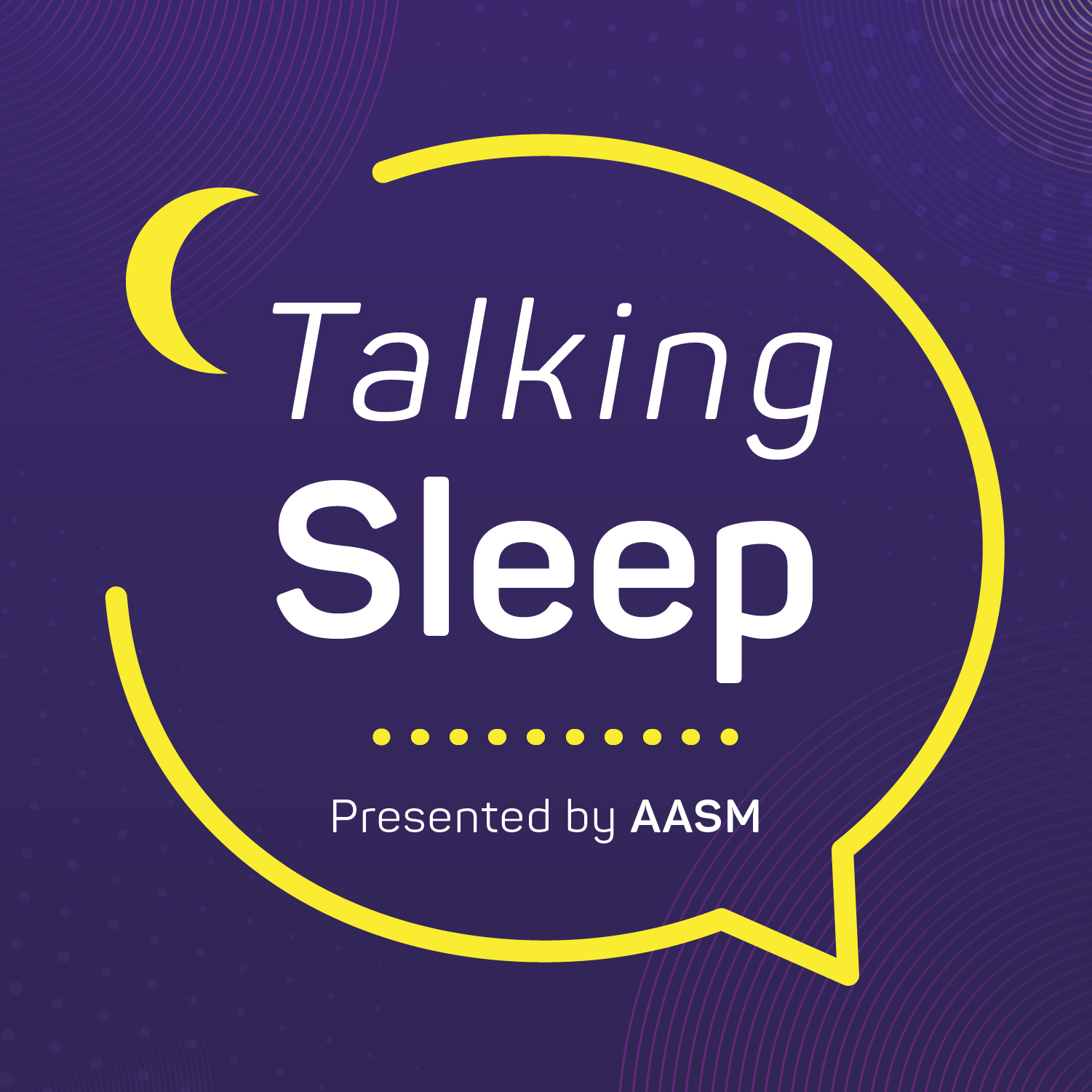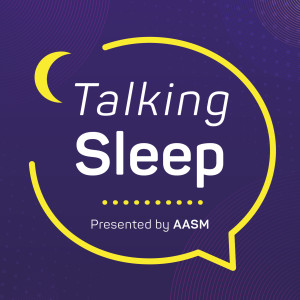
484.3K
Downloads
131
Episodes
The vast field of sleep medicine is always evolving. Listen to Talking Sleep, a podcast of the American Academy of Sleep Medicine (AASM), to keep up on the latest developments in clinical sleep medicine and sleep disorders. Our host, Dr. Seema Khosla, medical director of the North Dakota Center for Sleep in Fargo, will take an in-depth look at issues impacting the diagnosis and treatment of sleep disorders. Episodes will feature conversations with clinicians, researchers, sleep team members and other health care experts working to help us sleep well so we can live well.
The vast field of sleep medicine is always evolving. Listen to Talking Sleep, a podcast of the American Academy of Sleep Medicine (AASM), to keep up on the latest developments in clinical sleep medicine and sleep disorders. Our host, Dr. Seema Khosla, medical director of the North Dakota Center for Sleep in Fargo, will take an in-depth look at issues impacting the diagnosis and treatment of sleep disorders. Episodes will feature conversations with clinicians, researchers, sleep team members and other health care experts working to help us sleep well so we can live well.
Episodes

7 days ago
7 days ago
In this episode of Talking Sleep, host Dr. Seema Khosla welcomes Dr. Mark Boulos, Dr. Khullar, and Dr. Mak for an in‑depth discussion on a topic that has challenged clinicians for decades: Are hypnotics safe for patients with untreated obstructive sleep apnea (OSA)?
As new therapeutic options emerge and our understanding of comorbid insomnia and sleep apnea (COMISA) evolves, clinicians are increasingly confronted with nuanced decisions about when—and whether—to use hypnotic medications. The guests unpack the latest evidence and share insights from recent studies, including research evaluating dual orexin receptor antagonists (DORAs) such as lemborexant in individuals with sleep apnea.
The conversation begins with a review of hypnotic medication classes and explores which agents may be safer in untreated OSA, and which still raise concerns. The panel discusses a recent lemborexant study, its design, population characteristics (including BMI and OSA severity considerations), and whether industry sponsorship played a role. They clarify that while the study did not focus specifically on COMISA, it sheds light on how DORAs perform in people with sleep apnea—particularly in terms of respiratory metrics.
The experts tackle the practical clinical dilemma of treatment sequencing in COMISA: Should clinicians begin with cognitive behavioral therapy for insomnia (CBT‑I), initiate PAP therapy, or consider medications first? They walk through what is known about how different hypnotic classes—including z‑drugs, GABAergic agents, trazodone, and DORAs—affect respiratory drive and sleep architecture. The discussion extends to special circumstances such as REM‑related OSA, where increased REM sleep induced by certain medications may have unique implications.
The episode also considers broader emerging questions: Do DORAs improve apnea–hypopnea index (AHI) even without PAP? Can hypnotics be used strategically to improve sleep continuity without worsening respiratory parameters? And will future insomnia care rely on identifying phenotypes that respond differently to GABA‑based medications or wakefulness‑impairment targets?
Throughout the conversation, the guests emphasize evidence-based takeaways, including the central finding that DORAs do not appear to worsen OSA‑related metrics, offering reassurance for clinicians who might consider using a hypnotic in a patien with untreated OSA. .
Whether you regularly see patients with comorbid insomnia and untreated sleep apnea or simply want clarity on the evolving role of hypnotics in this population, this episode offers practical, research-grounded guidance for clinical decision making.
Join us for this important discussion on how hypnotics can be used safely and thoughtfully in patients with untreated OSA.

Friday Jan 30, 2026
Wearable Sleep Tech: Clinical Use and Best Practices
Friday Jan 30, 2026
Friday Jan 30, 2026
In this episode of Talking Sleep, host Dr. Seema Khosla welcomes three members of the World Sleep Society's consumer health technology task force—Dr. Michael Chee, Professor and Director of the Center for Sleep and Cognition at the National University of Singapore who chaired the guideline-writing task force; Dr. Mathias Baumert, an associate professor leading the biomedical engineering discipline of the school of Electrical and Mechanical engineering at Adelaide University in Australia, and Dr. Cathy Goldstein, professor of neurology at the University of Michigan. to discuss their global recommendations for the use of consumer sleep technology and wearable health trackers.
Consumer wearables have become ubiquitous in clinical practice, with patients routinely sharing device data. While some clinicians have historically dismissed this information, attitudes are shifting as technology improves and rigorous research examines sensors, algorithms, and data quality. Dr. Chee explains that the recommendations are designed for multiple audiences: end-users, clinicians, researchers, and manufacturers, with specific guidance for each group.
The conversation addresses practical considerations: the assumption that users have good perfusion, how bed partners can influence movement detection, and the fundamental truth that the best device is one patients will actually wear properly. The panel discusses recent FDA regulatory changes and clarifies whether guidance applies only to non-FDA cleared wellness devices or has broader implications.
The experts systematically review various metrics from wearables. They introduce TATS (total attempted time in sleep) and explain what clinicians should know about sleep onset and offset detection.
The episode emphasizes the call for standardized Fundamental Sleep Measures and greater transparency about test populations used in device validation. Dr. Baumert discusses the need to co-create benchmarks for measurement accuracy across different contexts—from persons with normal sleep to shift workers to those with sleep disorders.
Whether you're skeptical about consumer wearables or seeking guidance on interpreting patient-generated data, this episode provides evidence-based recommendations for moving forward responsibly.
Join us for this important discussion about embracing consumer sleep technology while maintaining clinical rigor.

Friday Jan 16, 2026
Central Sleep Apnea Treatment: New AASM Guidelines
Friday Jan 16, 2026
Friday Jan 16, 2026
In this season 8 premiere of Talking Sleep, host Dr. Seema Khosla welcomes three members of the AASM guideline committee—Dr. Rami Khayat, Professor and Division Chief of Pulmonary, Allergy & Critical Care Medicine and Director of Penn State Health Sleep Services; Dr. Shirine Allam, Professor of Medicine at Emory University and Program Director for the Pulmonary and Critical Care Fellowship at the Atlanta VA Medical Center; and Dr. Christine Won, Medical Director of Yale Centers for Sleep Medicine and Professor of Medicine at Yale University—to discuss the newly released AASM clinical practice guidelines for central sleep apnea treatment.
The conversation begins with the rigorous process behind guideline development, clarifying the distinction between evidence-based recommendations and expert opinion. The panel systematically walks through each recommendation, addressing CPAP use across various CSA etiologies including primary CSA, heart failure-related CSA, medication-induced CSA, treatment-emergent CSA, and CSA due to medical conditions.
A surprising recommendation against BPAP without backup rate generates discussion about why backup rates matter and why heart failure patients are excluded from certain BPAP recommendations. The experts tackle the controversial topic of adaptive servo-ventilation (ASV), explaining why it's now conditionally recommended even for heart failure patients despite SERVE-HF trial concerns. They clarify that newer ASV algorithms differ from devices used in that study and emphasize the importance of patient-provider shared decision-making and treatment at experienced centers.
Practical implementation guidance covers oxygen therapy for heart failure and high-altitude CSA, including insurance coverage challenges. The panel discusses acetazolamide use across multiple CSA etiologies, providing concrete advice on prescribing and follow-up protocols. Transvenous phrenic nerve stimulation receives attention as an option for select patients, with candid discussion about its invasive nature, accessibility limitations, and high costs.
The episode addresses the shift toward viewing CSA treatment as chronic disease management, including billing code G211 implications. The experts emphasize that guidelines guide but don't constrain clinical judgment, stressing the importance of monitoring beyond AHI—including patient symptoms and quality of life improvements.
Whether you're treating patients with CSA, navigating insurance coverage, or seeking clarity on when ASV is appropriate, this review provides essential guidance for implementing evidence-based CSA treatment.
Join us for this season premiere that translates complex guidelines into practical clinical applications.

Friday Dec 12, 2025
JCSM Year in Review: Top Sleep Research of 2025
Friday Dec 12, 2025
Friday Dec 12, 2025
In this episode of Talking Sleep, host Dr. Seema Khosla welcomes Dr. Safwan Badr, the newly appointed editor of the Journal of Clinical Sleep Medicine and sleep medicine physician at Wayne State University, for an in-depth review of the most impactful articles published in JCSM during 2025.
Dr. Badr discusses his vision for the journal and the editorial selection process, then guides listeners through key research findings shaping clinical practice. The conversation highlights both highly popular papers and important studies that deserve more attention from practicing clinicians.
A significant focus is placed on research confirming that traditional 4% hypopnea criteria and CMS definitions systematically underestimate sleep apnea in women, with expanded diagnostic criteria helping mitigate these gender disparities. The episode explores groundbreaking research on sleep architecture and Alzheimer's disease, examining how lower slow wave sleep and REM sleep correlate with brain atrophy in AD-vulnerable regions, particularly the inferior parietal lobe.
Consumer sleep technology receives critical examination through a meta-analysis comparing wrist-worn devices to polysomnography, revealing significant limitations in accuracy. Dr. Badr discusses implications for physicians and consumers who increasingly rely on these devices. Mental health intersects with sleep medicine through research showing that nightmares and insomnia in the acute aftermath of trauma predict suicidal ideation—nearly half of acute trauma patients with both conditions experience suicidal ideation within two months, highlighting urgent need for early interventions.
Additional topics include Canadian research on CBT-I effectiveness during pregnancy and findings from the TODAY study examining obstructive sleep apnea's relationship with glycemic control and cardiovascular risk in young adults with youth-onset type 2 diabetes.
Whether you're looking to stay current with evidence-based practice changes, interested in emerging research on sleep and neurodegeneration, or seeking to understand gender disparities in sleep medicine, this year-in-review provides essential updates.
